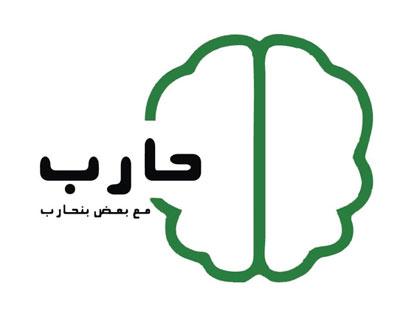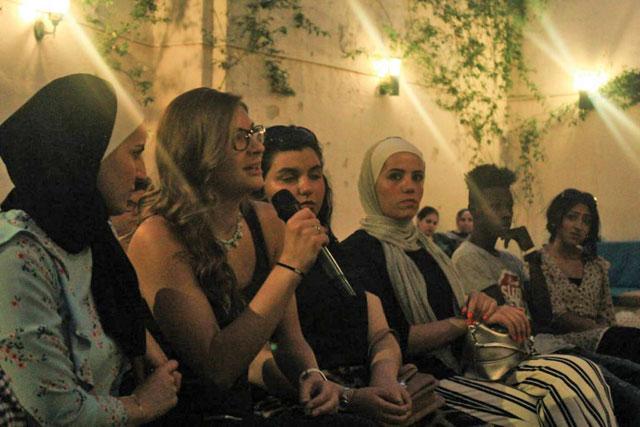You are here
Initiative strives to ‘fight back’ mental illnesses
By Camille Dupire - Jul 05,2018 - Last updated at Jul 05,2018

AMMAN — Mental illnesses can be fought and people with mental health issues should not be victims of their symptoms, said young Jordanian activist Yazan Halasa, as he explained the idea behind “Hareb” the social media campaign he co-founded to raise mental health awareness in society.
“We are not only fighting the disease itself, but also the stigma, the taboos surrounding our community,” the 23-year-old medical student told The Jordan Times on Wednesday, stressing “ultimately, we hope to eliminate the ‘mental illness crisis’ in our society.”
Built on the idea that Jordan’s communities are “plagued with unaddressed and unacknowledged mental problems”, Hareb (meaning “Fight” in Arabic) seeks to tackle the perception of mental illness as a weakness, according to its founder, who noted that the World Health Organisation (WHO) considers mental health as an “integral and essential component” of health.
“By turning a blind eye to this issue, we have turned our communities into a breeding home for depression and anxiety. At turn, these emotions spawn unhealthy thoughts which beget unhealthy beings,” said Halasa, who started the campaign two years ago during his fourth year at university.
According to the WHO, one out of four people will suffer from a mental or neurological disorder in their life, amounting to an estimated 450 million people globally.
In 2008, Jordan was identified by the WHO as “a country in need of intense support for strengthening the mental health system”, while a comprehensive report by the WHO and the Ministry of Health recently stated that “while several local and international NGOs and agencies and professional associations have participated in public education and awareness campaigns on mental health in the last five years, activities have been very limited and infrequent”.
“At Hareb, we believe in the groundbreaking and revolutionary power of education,” the young man stressed, noting “by educating people on the very real nature of mental health and its effects on a group of people, we will come one step closer to identifying, addressing and aiding the community.”
Since its establishment, the campaign has been conducting a number of awareness raising sessions, both physically and on various media such as radio, TV and online platforms, aiming to exchange knowledge and spread awareness on depression and anxiety.
“We go around schools and communities to discuss these topics, but we also hold events and social experiments to eliminate the stigma that goes with mental illness,” Halasa explained, citing sessions involving comedian and psychiatrist Laith Al Abbadi.
“Education paves the way for acceptance and will allow people to take the proper steps and necessary precautions to help and understand each other,” the co-founder stressed.
He recounted one event, the “Walk for Depression”, which gathered over 100 people walking the streets of Amman to raise awareness about depression and support people suffering from it.
For Jordanian Ali Naim Jaloudi, “Hareb is a great initiative. From my long personal experience, I understand that it is difficult for people to recognise that mental illnesses are just like physical illnesses, that they can be treated and that people can seek medication for their souls like they do for their bodies.”
In January, Hareb published a list of psychiatrists registered with the Ministry of Health in Jordan, aiming to provide guidance to patients seeking help.
“Honestly, when I was in need for psychological help, I was truly helpless. I did not know who to turn to or if there even were specialised professionals available for my case,” remembered a young woman diagnosed with depression one year ago.
“It was really hard because I had no one to talk to about it, so I mostly read and exchanged with strangers online, which can also be very detrimental sometimes,” she said, preferring to remain anonymous.
Even the Hareb campaign still faces challenges in society, as some online users keep publishing denigrating or discriminating comments.
“Our initiative fights to raise awareness about psychiatric diseases, far away from sarcasm and banter. It can be hard when we see such comments of people who don’t take the issue seriously, as they may lead to even more mental damage for people affected by mental illness,” stressed Halasa, encouraging everyone to “understand the daily plight of people living with mental illnesses”.
“We chose the name ‘Hareb’ because it is very empowering to know that you can fight the disease. It is a battle, and you can fight and succeed,” Halasa concluded
In Jordan, there are 50 public mental health clinics affiliated with the Ministry of Health across the Kingdom. In Amman, four independent public mental health clinics are running as advisory clinics for psychiatry, according to the National Centre for Psychological Health.
Related Articles
AMMAN — A community event recently tackled the issue of public perceptions and misconceptions surrounding mental illness, with the aim of no
AMMAN — While half of all mental illness begins by the age of 14, most cases remain undetected and untreated for years, if they ever are at
AMMAN — A group of citizens is advocating for a community-based approach to raise awareness of mental health in the Jordanian society and re

















